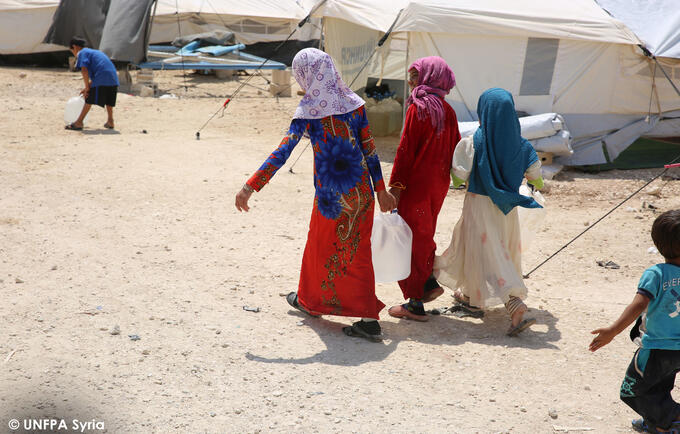In a women center in Egypt supported by UNFPA, the United Nations sexual and reproductive health agency, Amal, a 16-year old Syrian refugee girl, seemed to be thriving. Along with her mother and twin sister, Amal registered for several activities including community theatre. It quickly became clear that she had exceptional talent and passion for theatre. But the case managers at the center observed a few disconcerting signs; she consistently exhibited signs of distress and occasional depression, and was seen crying in solitude several times.
When she finally opened up, Amal told case workers about her secret dilemma:
“When it comes to marriage, we often find ourselves in a constant battle with our families,” Amal explained, “the pressure begins when a girl begins to physically grow into a young woman, and becomes worse with each passing year. They do not understand that we are simply not ready.”
Amal said the pressure quickly gave way to escalating physical violence in an effort to force her to accept marriage.
In times of humanitarian emergencies and displacement, adolescent girls’ transition into adulthood becomes even more complicated than usual. Recent data shows that the rate of child marriage among Syrian girls is now four times higher than it used to be before the war. The poverty and lack of security that comes with the experience of displacement are often cited as leading causes of families’ increased tendency towards marrying off their daughters early. Early marriage has crippling effects on girls’ futures. They become more vulnerable to violence and they are more likely to drop out of school and to live in poverty. Complications from early pregnancy is the leading cause of death among adolescent girls between 15 and 19 years of age.
For Amal, the entire ordeal was bringing her close to despair.
“There were days when I simply couldn’t help myself,” Amal recounted, “the sadness would just hit me and I would burst into tears, not knowing what to do or who to turn to.”
Case workers referred Amal to one-on-one counselling which she hesitated to accept at first. During the counseling sessions, Amal found a safe outlet for her fears. She explained to the psychologist the pressure she had been under. The sessions continued for several months with a focus on allowing her to process the trauma and devise positive mechanisms for coping with her situation. She was also enrolled into a teenage support group as well as a series of awareness sessions on early marriage, which only reinforced her views on the subject.
“These sessions have been extremely helpful. I constantly feel more empowered and able to stand up against the violence I had been experiencing. I also learned how to communicate with my parents more effectively about who I am and what I want in life, which at the moment is to continue my education and explore my passion for theater,” Amal said.
Amal was recruited as the coordinator of the theatre training team and she hopes this would be a beginning of a long and fruitful career.
Through 124 Women and Girls Safe Spaces, 143 primary healthcare facilities, and 38 youth centers, UNFPA continues to provide essential reproductive health and gender-based violence services to women, girls, men and boys impacted by the Syria crisis.
Read more about UNFPA’s response to the Syria crisis in our most recent situation report.


